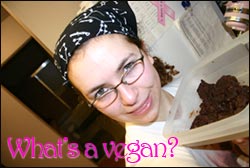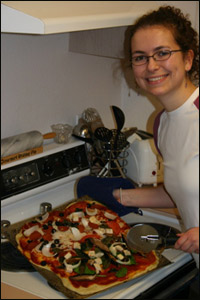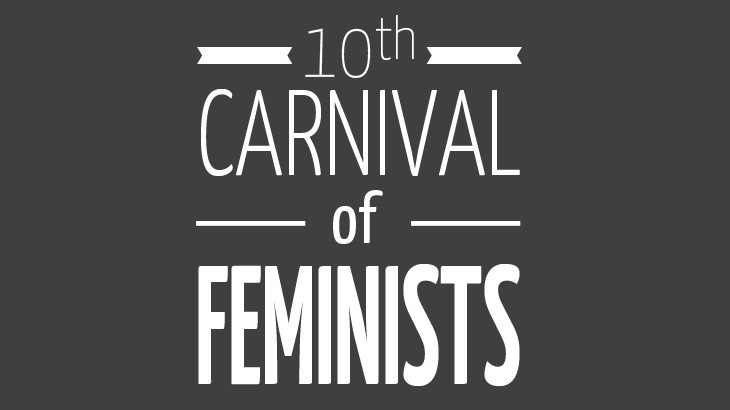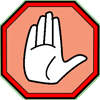So, yesterday was Blog Against Sexism Day. I blogged. You blogged (or should have, you bad, bad person!). We all blogged. Today, I want to highlight some of the ones that I particuarly liked. Now there are 260 posts, and I obviously haven’t read them all, so if you have a favourite post (even if it’s your own!) please feel free to plug it in the comments.
bla(k)ademic (who I’ve been meaning to blogroll for ages) contributes the post complicit sexism, which talks about the intersection between oppressions, and how it is disappointing that many black “leaders” and scholars fail to acknowledge that.
Highlight:
many blacks who oppose gays/lesbians/trannies/sgl’s, have failed to acknowledge that racism cannot be combated if we continue to support white ideals of morality and family values. which, only pushes a conservative agenda that condemns any deviation from the nuclear family that doesn’t uphold strict gender roles. the limiting idea of the black patriarch who rules over the subsurvient wife and children, only furthers blacks complicit relationship with our own race and gender exploitation. this myth has prohibited an alternative view of of a queer black family comprised of sgl/gay/lesbian families parents. and, i think, that it is sexist for us to continue to believe that the definition of a heteronormative family is going to save us from oppression.
Over at New Game Plus, our very own Ariel writes a short post on the problematic nature of a new “realistic” redesign of one of video game’s most famous vixens in A Lara Croft I Can Be.
Highlight:
As a gaming woman, I don’t find Lara Croft’s new proportions especially empowering or representative of me. It’s another message of how I ought to look so I can be sexy, confident, and poised. The consensus was that Croft was ridiculous, even from those who found her aesthetically pleasing. Now, she’s “realistic.†I could, theoretically, look like the new Lara Croft; she’s become within the realm of possibility existing. I’ve already “won†genetic lottery—I’m white, brunette, not fat—and now I just need to get breast implants, work out more, and stop eating.
The one who started it all, vegankid, contributed the post don’t kid yourself, which does some reflecting on the internalized, and often invisible, sexism that exists in the trans community.
Highlight:
Its easy as transgendered and genderQueer people to believe that we are beyond or outside of gender politics as usual. As those who live on the margins, its only natural to focus on ourselves as oppressed beings – victims of a transphobic society. But something i’ve had to come to terms with is my own socialized sexism as a trans persyn.
From Amateurverbs, a new blog to keep your eye on, comes a poignant critique on the culture of female competition entitled Good girls and bad girls.
Highlight:
But the bad girls – oh, you know what I’m talking about. The ones who disagree with me! The sluts who talked behind my back, who did stupid, stupid things and whose heads are filled with air. The Barbie-doll bitches and holier-than-thou dainty princesses who’d rather die than get their dresses dirty.
Only the bad girls are the ones that make me feel good inside. I can point at them and say, “Look! I’m not like her! I’m not a whore, I’m not a ditz, I’ve got a brain! But I’m pretty!â€
A personal story given political implications at Weber’s Polar Night, Blog against sexism is the tale of one man’s journey as a go-between for his girlfriend when some random men find themselves with some car troubles.
Highlight:
Sexism is, of course, many things but at that moment it was a very small thing: an exchange of information, relayed via a man, because the woman who actually knew what to do felt constrained and the men in need of help were, she correctly assessed, unprepared to listen.
Feminist Law Professors are also interested in Blogging Against Sexism, this time about women’s internalized sexism and how relying on men for approval is a double-edged sword.
Highlight:
When I read or hear a woman criticize another woman for her clothing, or hair, or body size, or general lack of femininity or sex appeal because it helps her curry favor with powerful men, I always think, if things go a certain way, she is going to find out that she isn’t as much “one of the guys†as she thinks she is. The men may laugh with her when she amusingly derides her sisters, but they will not trust her any more than the women she mocks will.
What it feels like for a geek girl, brought to us by Radioactive Banana relates the mixed signals that women who want to enter traditonally male dominated fields receive from their family, friends, and the world at large.
Highlight:
Finally in junior high I was set on mastering math and science, just like my mother had prodded me because she thought those were secure jobs—but now her efforts were directed at turning me into a properly socialized young woman, which seemed to mean dialing my competitiveness down a couple notches. Yes, I was cocky and full of myself—but so was [my gifted math class carpooling partner] Jon! Did he ever have to hear that it threw off the family dynamic for a girl to be more mathematically gifted than her older brother? Because that’s what my mother told me.
From the mind of Bitch|Lab comes an excellent essay on Oppression: what it is, what it means, and how it can be used against the oppressed.
Highlight:
The statement that women are oppressed is frequently met with the claim that men are oppressed too. We hear that oppressing is oppressive to those who oppress as well as those they oppress. Some men cite as evidence of their oppression their much-advertised inability to cry. It is tough, we are told, to be masculine. When the stresses and frustrations of being a man are cited as evidence that oppressors are oppressed by their oppressing, the word “oppression†is being stretched to meaninglessness; it is treated as though its scope includes any and all human experience of limitation or suffering, no matter the cause, degree or consequence. Once such usage has been put over on us, then if ever we deny that any person or group is oppressed, we seem to imply that we think they never suffer and have no feelings. We are accused of insensitivity; even of bigotry. For women, such accusation is particularly intimidating, since sensitivity is on eof the few virtues that has been assigned to us. If we are found insensitive, we may fear we have no redeeming traits at all and perhaps are not real women. Thus are we silenced before we begin: the name of our situation drained of meaning and our guilt mechanisms tripped.
gendergeek wanted in on the action of Blogging Against Sexism, this time choosing to highlight the sexism of reproductive politics.
Highlight:
As far as I’m concerned, women will never be able to achieve equality with men while our very right to physical autonomy is being denied us. The battle for women’s bodies has shaped each wave of feminism, and, in 2006, we are still being forced to state and re-state our demands for access to birth control, abortion, appropriate medical treatments, and freedom from gender-based violence.
And last on my list, but not last in excellence by any stretch of the word, is Mind the Gap‘s post on (Trying) to blog against sexism. It addresses everything from the myth that sexism is a thing of third-world (aka. “backwards”, aka. “not as good as us”) nations to the fact that women’s looks are still considered our paramount attribute, no matter the context.
Highlight:
First, we hate that so many people in the rich west insist that sexism is no longer an issue or is, at most, a minimal issue. We’ve met supposedly, liberal, enlightened people, men and women, who claim that since we have all this legislation in place, there’s no longer a problem. As Siberian Falls observed, the situation has changed, but sexism has become more insidious rather than disappeared. Even more worryingly, the anti-political correctness backlash has managed to bestow certain “coolness†upon sexist attitudes. Siberian Falls told us the story of the consultant who refers to female colleagues as “chickie.†He knows he’s being offensive because he’s quick to say “It’s harmless,†“It’s just a bit of fun.†“Just a bit of fun.†Haven’t we all come to shudder at that phrase which has become the excuse for all manner of appalling behaviors. I’m sure it’s true that sexism is enormous fun for sexists, but not for the rest of us.
See the rest of the pinbacked and trackbacked links here (you may have to click the “show comments” link and then reload the page).






